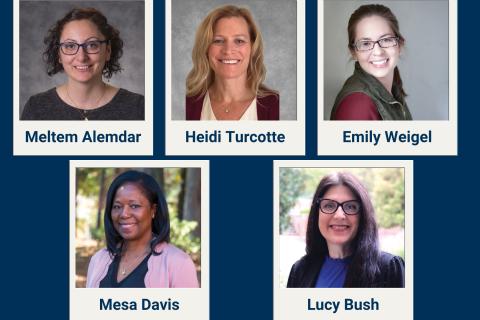
Georgia Tech collaborates with Clayton State University and Mercer University on new NSF-Micron-funded research project.
Georgia Tech researchers Meltem Alemdar and Heidi Turcotte from the College of Lifetime Learning, along with Emily Weigel from the College of Sciences, have been awarded a National Science Foundation (NSF) grant (Award #2345019). They will develop and implement a university-based summer program called Research Experiences for Pre-Service Teachers (REPST), recruiting participants from partner institutions Clayton State University and Mercer University.
Georgia Tech researchers Meltem Alemdar and Heidi Turcotte from the College of Lifetime Learning, along with Emily Weigel from the College of Sciences, have been awarded a National Science Foundation (NSF) grant (Award #2345019). They will develop and implement a university-based summer program called Research Experiences for Pre-Service Teachers (REPST), recruiting participants from partner institutions Clayton State University and Mercer University.
Their project is one of four funded by a new partnership between NSF and the Micron Foundation, aimed at advancing STEM education training for both pre-service and in-service teachers.
“Participation in STEM research experiences has shown to improve teachers’ STEM knowledge and experience, scientific research practices, career awareness, and STEM efficacy and identity, which in turn leads to persistence in teaching and teacher retention,” said Alemdar, a principal research scientist and director of educational research and evaluation in the Center for Education Integrating Science, Mathematics, and Computing (CEISMC).
The three-year, $749,749 grant is awarded through NSF’s Robert Noyce Teacher Scholarship Program. For over 20 years, the Noyce program has supported the recruitment, preparation, and retention of STEM K-12 teachers in high-need and under-resourced school districts.
According to Alemdar, who serves as the principal investigator for the project, many teacher preparation programs lack the funding and research labs necessary to provide these immersive experiences to their teacher candidates.
“Our goal is to develop a sustainable model that pairs pre-service teachers with both researchers and mentors during six weeks through our REPST program,” she explained. “For example, veteran teachers will be the primary support, assisting with lesson plan development and ensuring the effective transfer of these plans to the classroom when the participants become student teachers the next academic year following their summer experiences.”
The research team plans to recruit up to 30 pre-service teachers over the duration of the grant through the efforts of co-principal investigators Mesa Davis, assistant professor and director of field experiences in the School of Education at Clayton State and Lucy Bush, professor of teacher education and associate dean of graduate academic affairs in the Tift College of Education at Mercer. They will serve as faculty leads to ensure the REPST program meets the needs of teacher candidates through program development and recruitment strategies.
The REPST program, which will take place at Georgia Tech, is modeled after CEISMC’s Georgia Intern-Fellowships for Teachers (GIFT) program. Since 1991, GIFT has collaborated with university researchers, business and community leaders and local K-12 schools to provide more than 2,200 classroom teachers statewide with hands-on experience in STEM.
“GIFT teachers improve their craft by integrating internship experiences into lesson plans, mastering pedagogy, and understanding how scientists and engineers solve problems,” explained Turcotte, who serves as a co-principal investigator for the grant and is the current GIFT director. “With REPST, we aim to engage teachers early, supplementing their preparation programs to build a strong STEM foundation, ensuring they become effective educators from the start.”
Turcotte has also worked with Georgia Tech faculty to help support broader impacts and outreach initiatives for K-12 programs in her role as program director for CEISMC’s campus and community coordination. In fact, faculty have consistently included GIFT as part of their broader impact statements on research grant proposals.
One of the main objectives of REPST is to establish a robust mentoring infrastructure involving Georgia Tech faculty, graduate students, post-doctoral researchers, and veteran in-service teachers. These mentors will play crucial roles in supporting the participants during the summer experience as well as continued interactions through their school-year student teaching.
“Over the last 20 years or so, we’ve been emphasizing less content and more practices of science. It’s challenging to guide others through these practices if you haven’t engaged in them yourself,” said Weigel, a senior academic professional and a co-principal investigator for the grant.
As internship director within the School of Biological Sciences, Weigel has seen firsthand how on-the-job learning experiences can make a significant impact. She has successfully placed and evaluated over 60 biology undergraduate students at internship sites, including the U.S. Fish and Wildlife Service and the Centers for Disease Control and Prevention.
“We would like to have the same impact through the REPST program by providing authentic experiences in scientific practices,” she said. “When you’re well-versed in these practices, you can effectively teach your students, identify potential trouble spots, and significantly enhance your teaching capabilities through your own authentic experiences.”
The research team has secured support for internship placements in Georgia Tech labs for the pilot summer in 2025, thanks to many faculty members’ familiarity with the GIFT program and their experience hosting teachers. In addition to Weigel, faculty from the College of Sciences and the College of Engineering, all of whom had been previous GIFT mentors, have pledged to participate in the REPST program. The list includes:
- William Ratcliff, School of Biological Sciences, evolution of multicellular organisms;
- Lily Cheung, School of Chemical and Biomolecular Engineering, plant engineering;
- Hermann Fritz, School of Civil and Environmental Engineering, fluid dynamics of natural hazards; and
- Xing Xie, School of Civil and Environmental Engineering, environmental engineering.
CEISMC Research Associate Katie Boice King rounds out the research team, serving as the program evaluator to assess the feasibility and scalability of the program and its impact on pre-service teachers’ self-efficacy and STEM identity development.
—Joëlle Walls, CEISMC Communications